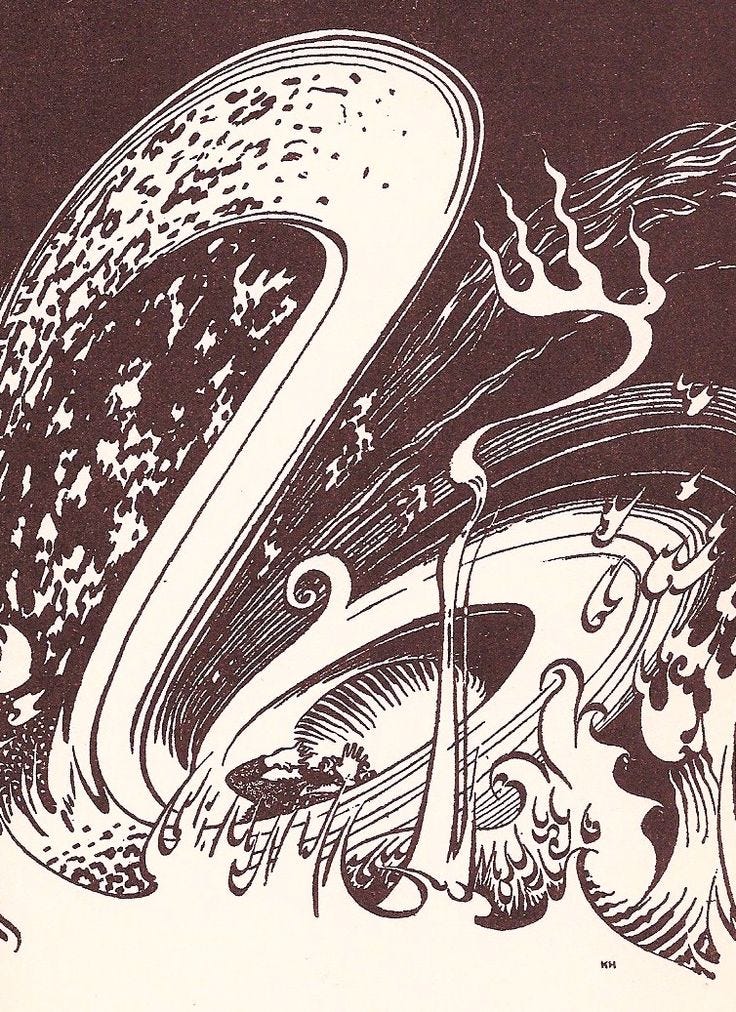The Worm Ouroboros
Eternity lies before us
“Us, little children of the dust, children of a day, who with so many burdens do burden us with taking thought and with fears and desires and devious schemings of the mind, so that we wax old before our time and fall weary ere the brief day be spent and one reaping-hook gather us home at last for all our pains.”
The above passage is excerpted from E. R. Eddison’s The Worm Ouroboros. Our current year is the novel’s hundredth anniversary, which makes it older than Middle Earth, Narnia and their derivatives. Many reviewers have already covered The Worm, its plot, its narration and its many peculiar qualities. Therefore, I will restrict myself to the book’s rather striking closing sequence. If you like fantasy, please read the book before scrolling down. You will find it well worth your effort. If not, or if perchance you have already read The Worm, pray continue.
We are all on the same page? Good.
The Worm Ouroboros concludes with the complete military triumph of a race called the demons. Do not be deceived by such a menacing name. The demons embody virtue and natural nobility, qualities contrary to their vanquished foes: the witches. This is a happy ending. The demons have subjugated the whole world by their courage and mastery of arms and they utterly extinguished all such evils as may be extinguished at the point of a sword.
Therefore, they despair.
The demons recognize that their virtues flow from bravery and the exercise of arms. Without the sharpening of war, they must diminish to a petty and vulgar race. They can no longer fight wicked things, for they have extirpated them. They cannot fight each other because of love. Therefore they cry out to the gods and the gods answer. By the very action of divinity, the cruel and treacherous race of the witches is resurrected and the demons rejoice in the anticipation of battle. There the story ends.
First, Eddison’s glorification of war in no way resembles the current pornographically gritty style most famously exemplified in Game of Thrones, wherein the author attempts to convey the horror of war but the reader is nonetheless meant to enjoy said depravities. Eddison’s characters love the melee: the bright blades, the gay shields, the clash of arms and tilt of lances; all the pageantry of battle. Nor are they content with decoration. They adore the peril and the mighty deeds, often admiring the worthy deeds of their foes. The Worm Ouroboros extols the virtues of war. Game of Thrones wallows in the sorrows. This is not to say the Worm dismisses suffering but it does believe that the pain outweighs the glory.
It is not easy to judge which perspective is correct. Even were we all to go to war, and thus gain personal experience, we could still argue over types and circumstances that might make certain kinds of combat more or less glorious or horrifying. Heroic swordplay outside the gates of Troy is not quite the same thing as charging through half a mile of mud and barbed wire into machine gun fire. Then we ought also consider individual temperament. Leaving aside cowardice, it is reasonable to suppose that certain men of action might enjoy the vigor and the peril more than other more gentle men who yet possess the same degree of bravery.
History records many men who professed to relish warfare. Likely, they told the truth. We can enjoy the novel experience of a novelist attempting to simulate this feeling rather the feeling of those men who hated every moment of strife.
The Worm’s resurrection of the witches addresses the same historical, indeed theological, concern that we brought up in our first post on this site. What is left to man when he has triumphed in the great struggle for survival? What do we do once when have won if our happiness derives from the satisfaction of the struggle to win? The athlete derives great satisfaction from the trophy but it is meaningless without the preceding struggle against the competition.
To a slight degree, The Worm misses the question. Perhaps the demons would not be satisfied without constant struggle but ordinary men would likely find themselves happy in winning one great war in their lifetimes. But this is only a small objection. If the fathers are well, the sons will yet be unhappy in their inherited victory, if they have not the next frontier to conquer for themselves.
The Worm’s conclusion does not satisfy. To artificially recreate an old struggle robs it of its meaning. Why were we fighting to begin with? Suppose it was for our children. Now that we’ve won and the children have a bright future, shall we choose to place them in danger for the sake of rescuing them from danger? Eddison’s solution is vaguely onanistic. To make an analogy with the Roman Catholic view on sex, war without its attendant circumstances, survival, honor or even the mere desire for resources, loses all of its glory. In their war with the witches, the demons fought with the righteousness of the wronged. How can they summon the same fury when, in every sense of the phrase, they brought it upon themselves?
Still, we ought to credit Eddison for recognizing the problem.



Well said, good sir.
'And Lord Juss spake and said, "We may well cast down our swords as a last offering on Witchland's grave. For now they must rust : seamanship and all high arts of war must wither : and, now that our great enemies are dead and gone, we that were lords of all the world must turn shepherds and hunters, lest we become mere mountebanks and fops, fit fellows for the chambering Beshtrians or the Red Foliot.'"
>Why were we fighting to begin with?
The fight itself lends itself to transcendent experiences brought about by proximity to death.